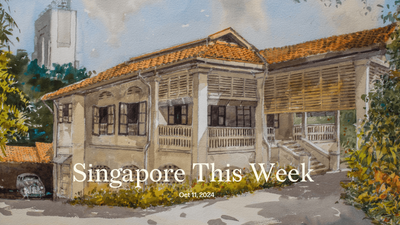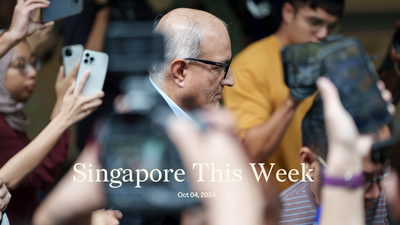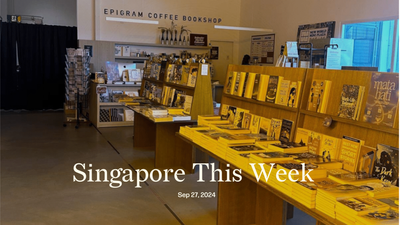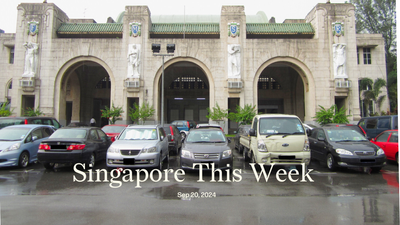Politics: The race for the presidency heats up
(Update after our publication deadline: at around noon today, the presidential elections committee confirmed that Ng, Tan and Tharman had qualified but Goh had not.)
On August 22nd, Singaporeans find out which of the four men vying for the presidency has qualified for the race. Candidates then have nine days to campaign, followed by a cooling-off day and polls on September 1st. It’s been called an impossible deadline and a “manipulation of democratic processes” by Yee Jenn Jong, a former non-constituency member of Parliament with the Workers’ Party. Still, the four seem ready. Tharman Shanmugaratnam, former senior minister, is the only candidate who clearly meets the stringent eligibility criteria, which in theory ensures that only Singaporeans with sufficient governance chops can ever hold the second key to our reserves. In practice, though, it’s been criticised as undemocratic and effectively limiting the race to people friendly to the ruling People’s Action Party (PAP). Tharman qualifies under the public sector automatic track. The other establishment candidate, Ng Kok Song, is a former GIC chief investment officer who may qualify under the public sector deliberative track. Ng has tried to distinguish himself from Tharman by saying he is “non-government-endorsed” and thus independent. Meanwhile, the two self-proclaimed “non-establishment” candidates are George Goh, founder of Harvey Norman Ossia (and Singapore’s non-resident ambassador to Morocco since 2017), and Tan Kin Lian, former boss of NTUC Income. They hope to qualify under the private sector deliberative track. (Tan qualified for the 2011 race, but the criteria has since tightened.) While Tharman is the only career politician, and the others have been portraying themselves as far from the establishment, the extent to which any of these men will stand up to the PAP is a matter of debate. In any case, the president in a largely ceremonial role is “supposed to work within prescribed boundaries”, said George Yeo, a former minister, in describing why he declined the chance to run in 2011. Yeo said he’ll be happy with either Ng or Tharman in power. Many Singaporeans hope that Goh and/or Tan also qualify to run. (Tan has said he’ll step aside if Goh qualifies.) Others are thinking of spoiling their votes, amid suggestions by academics that the entire institution is flawed. Come Tuesday, Singaporeans will know if they’ll even get to vote.
Society: Wikimedians in Suntec City this week ‘to celebrate knowledge’
“A world in which every single person on the planet is given free access to the sum of all human knowledge,” was how Jimmy Wales, who co-founded Wikipedia in 2001, once described its goal. In 2004, the English-language Wikipedia became the world’s largest encyclopaedia when it hit 300,000 articles. It now has almost 6.7m, alongside versions in 333 other languages. Its epistemological importance to the world has also evolved in a fundamental way. The New York Times called it “...a kind of factual netting that holds the whole digital world together. The answers we get from searches on Google and Bing, or from Siri and Alexa—‘How old is Joe Biden?’ or ‘What is an ocean submersible?’—derive in part from Wikipedia’s data having been ingested into their knowledge banks…Wikipedia is probably the most important single source in the training of AI [artificial intelligence] models.” The risk of AI eventually replacing all those dogged (volunteer) Wikimedians is one of the many things being discussed at the annual Wikimania conference, held in Singapore for the first time this week (and the first in person since the pandemic). Hundreds of Wikimedians from around the world are expected. Other panels range from the philosophical (“When public becomes private and everybody is a suspect - freedom of expression in early 21st century”) and practical (“Networking for introverts: How to make the most of this conference”) to the technical and urgent (“IP Masking: Big Change to Protect Editor Privacy”; Wikipedia editors, including some 40,000 English-language ones, can be the targets of abuse.) A “Punjabi audiobook project” and the “Art+Feminism West African Indigenous Language Program” give some indication of the participants’ wide origins. Singapore may seem like an odd venue for Wikimania, whose non-profit foundation professes opposition to government surveillance and censorship. Perhaps our connectivity and convenience won out. Whatever the case, a very warm welcome to the Wikimedians who provide us all with such an essential service.
Society: TeachTok goes viral
Amidst the videos of ASMR mukbangs, bottles rolling down stairs, “what I eat in a day”s and K-pop idol fancams, local teachers are gaining clout on TikTok. Since the pandemic, more of them have been uploading short-form educational videos to the platform under hashtags like #learningisfun and #studytips. Between 2020 and 2021 alone, TikTok saw a 38-time increase in the number of educational videos covering everything from General Paper essay-writing tips and Geography lectures to tutorials for solving Maths problems. But teacher influencers aren’t immune to scandal. Brooke Lim, aka sugaresque—the young founder of tuition centre Classicle Club, with almost 180,000 followers—found herself embroiled in multiple online fiascos, including a messy back-and-forth with another teacher influencer, Jiabao Ge, over the alleged plagiarism of teaching materials. Controversies aside, it seems like both teachers and students are benefiting from this trend. Teachers have cited more productive classroom time—assigning students lecture-style videos to watch beforehand lets them address specific questions in class. Some have observed a stronger sense of ownership of learning. The flexibility of online content, including on Discord and YouTube, often facilitates differentiated learning—students can either watch videos that cover more advanced topics or revisit more foundational content for revision. Access to free educational material may also help ameliorate socio-economic inequalities between students. “Growing up, I didn’t have tuition, so it’s a dream of mine to do pro bono teaching,” Bernard Ng, a senior teacher who creates YouTube videos on Chemistry, told The Straits Times. However, some have cautioned that as #TeachTok becomes more mainstream, teachers might feel pressure to create online content in their personal time. Furthermore, social media algorithms don’t always curate appropriate content for young viewers. But as TikTok continues to be the new search engine for Gen Zs, it’s unlikely that this trend will slow down anytime soon.
Society: HOME report finds most criminal accusations against MDWs don’t lead to charges
“R3”, a migrant domestic worker (MDW), was mistreated by her employer and desperate to leave Singapore. She ran away, ending up at the shelter run by the Humanitarian Organization for Migration Economics (HOME). R3’s employer then accused her of physically abusing his 37-year-old brother, who has an intellectual disability. Ensuing investigations detained her here for 10 months, jobless. While the case resulted in “no further action” being taken against her, it took a massive financial and emotional toll on R3. In HOME’s latest report, “I’ve called the police”, R3’s is one of many criminal cases filed against MDWs here. The study draws on casework data from 100 MDWs who stayed at HOME’s shelter from January 2019 to June 2022. Over 80 percent of MDWs weren’t charged with the crime that they were accused of, due, for instance, to insufficient evidence. R3’s experience also exemplifies the concept of “revenge accusations”, a prevalent “retaliatory measure”, said HOME, that former employers take against MDWs after their contracts are terminated and they’ve moved out. Some 85 percent of these revenge accusations are for theft—“typically petty in nature” and have a “disproportionate disruptive and harmful impact.” Why so spiteful? It’s likely that an ex-boss who’s out for payback acts out of “anger, frustration [and] a desire to punish”, HOME explained. Karl Liew’s allegations of theft against Parti Liyani, for instance, were probably a pre-emptive move to prevent her from filing a complaint against the Liew family for illegal deployment. Parti and R3’s cases highlight labour exploitation and the “different norms” within the criminal justice system that MDWs encounter due to the “unique precarity” of work permit holders. HOME’s recommendations? Give MDWs assisting in investigations the “automatic right to employment”, as well as offer them live-out options and the ability to change employers.
History weekly by Faris Joraimi
Last weekend, I visited the micro-exhibition “Once Upon an Island: Images of Singapore” held at the Pullman Singapore Orchard hotel. Running until August 31st, it displays 16 beautiful photographic prints of Singapore between the 1950s and 70s. These aren’t just random bits of documentary material: they’re the work of the late Dr Ivan Polunin (1920-2010), one of the most interesting English expatriates to have lived in our city. Polunin was a medical doctor who was born near London, and moved to Malaya in 1948 to work in hospitals before teaching medicine at the University of Malaya. In his spare time he photographed and filmed prolifically, amassing hours of video footage and about 35,000 images on a vast range of subjects and places: jong (miniature Malay sailboats) in Pulau Seraya; Kallang aerial views before land reclamation; Chinatown trades and processions; Potong Pasir vegetable farms; and much more. Some of this was commissioned work for the BBC and Hollywood documentaries. But more importantly, they’re vital sources for us today, harking back to a Singapore with thriving biodiversity, and where so many ordinary people lived multifaceted and complex lives. Polunin was likely the only person here who used colour videotaping, still an advanced technology back then. One of my favourite Instagram accounts today, @ivanpoluninarchives, displays some of this material with thoughtful captions. It’s managed by one of Polunin’s four grandchildren, Kazymir Rabier, while another grandchild and Kazymir’s sister, Asmara, has been digitising Polunin’s images and working on a book presenting them. Polunin’s work has been recognised before, featured in Tan Pin Pin’s film “Invisible City”. The NUS Museum organised a dedicated exhibition called “I, Polunin: Memories of Singapore through Film and Photographs” while a 75-minute compilation of his work entitled Lost Images premiered on Okto that same year. About 2,000 pages of his writings were donated to the ISEAS-Yusof Ishak Institute Library, in 2012. Unlike a lot of earlier colonial ethnography, Polunin’s portrayals are respectful and moving; researchers in 2015 who used his images for the project “Island Nation” called him a “familiar foreign eye”. I thank him and also his family for letting us enjoy a little of the sunlight and colour our streets and shores once had.
Arts: BigO says ‘goodbye’
Independent music publication BigO has shuttered after 38 years. In its heyday in the 1990s, BigO’s coverage of rock and roll was an integral part of a burgeoning Singaporean music scene. It spotlighted acts like The Boredphucks, The Oddfellows, and Transformer, whose frontman, the late X’Ho, went on to become one of BigO’s most prolific and influential columnists. The publication began as a DIY fanzine before moving to a regular magazine format. Apart from writing about Singaporean music, it also served as a record label and gig organiser, bringing the music directly to fans. Some of the original BigO releases are available on the National Library’s MusicSG website, albeit in 50-second bursts only. BigO ceased its print edition in 2002 and was, until this month, an online-only outfit. It continued to publish on Singapore’s cultural scene and supplemented its output with crossposts from international publications, like US-based CounterPunch, on foreign politics and art beyond Singapore’s borders. In their farewell post, editors Philip Cheah and Stephen Tan and publisher Michael Cheah reflected on BigO’s cultural legacy and expressed tempered pessimism about the future of Singapore’s cultural scene: “We could only watch the indie music scene germinate. We could never see it flower.” BigO was undoubtedly a vital player in our local creative scene, but their closure should not be a bellwether of the scene’s demise. New players, such as Big Duck Music, Life in Arpeggio, Bandwagon, and now Singapore-owned legacy music magazine NME, continue to publish on music and culture from Singapore and its neighbours. Readers interested in live performances should also mark two upcoming festivals on their calendars: AXEAN Festival (formerly known as ASEAN Music Showcase Festival); and the Esplanade’s long-running Baybeats Festival, which has a mentorship programme, Baybeats Budding, for up-and-coming bands, emcees, photographers, and music writers. Baybeats is on from October 6th-8th and AXEAN will run later in the month from October 28th-29th.
Arts: Lucasfilm exits Singapore
Lucasfilm, the entertainment company founded by George Lucas, the creator of “Star Wars” and “Indiana Jones”, will exit Singapore at the end of this year. Lucasfilm Animation began operations here in 2004. Industrial Light & Magic (ILM), Lucasfilm’s visual effects (VFX) studio, followed suit in 2006. Parent company Disney, which acquired Lucasfilm in 2012, cited “economic factors” as the main reason behind the decision. The company announced in February that it would be cutting 7,000 positions internationally as a cost-saving measure. Its streaming arm Disney+ has lost US$11bn (roughly S$15bn) since its introduction in 2019, and has been haemorrhaging subscribers since Q2 of this year. Most of those subscriber losses were a consequence of Disney’s failed bid to renew the rights for Indian Premier League cricket. Subscriber numbers in other international markets have otherwise been on the up. Overall, though, Disney is not the profit-making juggernaut it used to be. Its traditional television business is also suffering and the full effects of the strikes by the Writers Guild of America and Screen Actors Guild-American Federation of Television and Radio Artists have yet to be realised. In Singapore, the Economic Development Board and Infocomm Media Development Authority have jointly assured affected employees that they will receive assistance in finding new roles. Vong Yonghow, a Singaporean VFX artist who worked at ILM, lamented on Twitter that his former colleagues would have a hard time finding work of the same calibre in Singapore, as ILM was the last studio here to work on large feature films. Luckily, ILM employees will also be offered opportunities to relocate to the company’s other studios—including the Mumbai location that just opened last October. Despite the company’s ongoing global retrenchment exercise, that office is still actively hiring.
Tech: Nosedive for Sea Group
Sea Group, the mothership behind Garena and Shopee, posted a gain in Q2 2023 revenues, though slightly below expectations. Earnings stood at US$3.1bn (S$4.2bn billion), a mere year-on-year increase of 5.2 percent, falling short of the expected US$3.2bn (S$4.3bn), causing an 11 percent dip in pre-market share prices. Shopee, Sea’s e-commerce arm, remains the group’s primary revenue source, contributing US$2.3bn (S$3.1bn). Coupled with US$150.3m (S$203.9m) in adjusted earnings, this performance underscores Shopee’s standing as a profitable entity. The company plans to boost investments in e-commerce across its markets. However, Sea’s digital entertainment division, Garena, suffered a significant 41.2 percent annual decrease in revenue, attributed to lower user engagement, which triggered lower monetisation rates. Simultaneously, Sea Group’s aggressive cost-cutting measures halved its marketing expenses compared to the same period in 2022. This frugality, along with calculated investments of US$172.5m (S$234.1m) into MariBank, shows a keen interest in expanding into the Singapore digital banking industry. Sea Group also said that Shopee’s focus on live-streaming is aimed at competing with TikTok Shop’s rapid regional growth. This strategy has proven effective with a marked surge in transaction volumes during live-streaming campaigns. Moving forward, Sea will strengthen its e-commerce platform, even as it works on reversing Garena’s downturn. While the regional tech giant’s shares dived due to the shortfall of revenue against expectations, prospects remain good, especially as it explores opportunities in emerging markets like Brazil.
Tech: Competition watchdog barks at Grab
Grab Rentals, a Grab subsidiary, looks to acquire Trans-cab, pending the approval of the Competition and Consumer Commission of Singapore (CCCS), which is seeking public feedback regarding the merger. Trans-cab, a private taxi operator, also offers car rentals among other services. The companies involved have submitted their merger proposal to CCCS, arguing that their integration will not lead to a substantial decrease in competition. It’s a claim based on the notion that both businesses have minimal overlaps, and that Grab will still face robust competition even after the acquisition. If successful, the deal expands Grab’s presence, adding more than 2,200 taxis, over 300 private-hire vehicles, a maintenance workshop, and fuel pump services from Trans-cab’s portfolio. According to a report by The Straits Times, it’s estimated that the acquisition, confirmed in July, is worth around US$75m (S$101.7m), although Grab hasn’t disclosed the financial details yet. The CCCS would consider public feedback, among other factors, in its evaluation process. This next stage of development in Singapore’s taxi and rentals landscape further illustrates the evolution and consolidation of this sector in the face of digital disruption. But does public feedback really matter? Afterall, Grab and Uber’s merger went ahead and was later dealt a S$13m fine by the competition watchdog.
If you enjoy Jom’s work, do get a paid subscription today to support independent journalism in Singapore.







